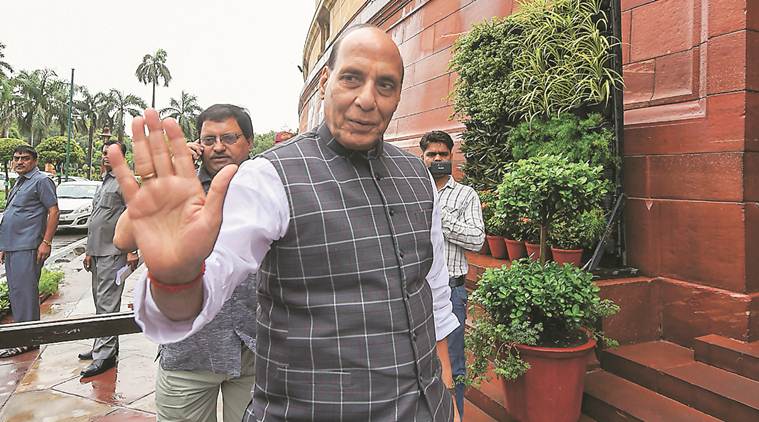“Pokhran is the area which witnessed Atalji’s firm resolve to make India a nuclear power and yet remain firmly committed to the doctrine of ‘No First Use’. India has strictly adhered to this doctrine. What happens in future depends on the circumstances,” Rajnath Singh said.
Known for his carefully calibrated choice of words, Union Defence Minister Rajnath Singh Friday created a flutter when he said that India remained “firmly committed” to the doctrine of “no first use” for nuclear weapons but indicated that this may not be etched in stone.
The Defence minister’s tweets came after visiting Pokhran where India carried out nuclear tests in May 1998 when Atal Bihari Vajpayee was Prime Minister.
Now, for the tightrope walk
India’s official position has been no-first-use since Vajpayee. But Rajnath Singh’s comments re-open the debate. As China and Pak cosy up on Kashmir and India aspires to join the NSG, Delhi will have to do a tightrope walk.
“Pokhran is the area which witnessed Atalji’s firm resolve to make India a nuclear power and yet remain firmly committed to the doctrine of ‘No First Use’. India has strictly adhered to this doctrine. What happens in future depends on the circumstances,” Singh said. He was in Pokhran to offer tributes to Vajpayee on his first death anniversary.
“India attaining the status of a responsible nuclear nation became a matter of national pride for every citizen of this country. The nation will remain indebted to the greatness of Atalji,” he said in a tweet.
A commitment to not be the first to use a nuclear weapon has long been India’s stated policy.
Singh’s comments come when Pakistan has been whipping up the rhetoric in the wake of the abrogation of Article 370 and bifurcation of Jammu and Kashmir. Pakistan PM Imran Khan had told Pakistan’s Parliament that the Indian government’s move could ultimately lead to a conventional war between the two nuclear-armed neighbours which was perceived in Delhi as nuclear blackmail by Pakistan which has developed “tactical” nuclear weapons.
While Singh’s remark doesn’t necessarily mean that the government is looking at a review of the nuclear doctrine, it could re-open the debate on no-first-use policy and.
These comments come almost three years after then Defence minister Manohar Parrikar had, on November 10, 2016, also questioned the no-first-use policy of India, saying why should India “bind” itself when it is a “responsible nuclear power”. Later, he clarified that this was his personal opinion.
India first adopted a “No first use” policy after its second nuclear tests, Pokhran-II, in 1998. In August 1999, the government released a draft of the doctrine which said that nuclear weapons are solely for deterrence and that India will pursue a policy of “retaliation only”.
The document also maintained that India “will not be the first to initiate a nuclear first strike but will respond with punitive retaliation should deterrence fail” and that decisions to authorise the use of nuclear weapons would be made by the Prime Minister or his “designated successor(s).”
Despite the escalation of tensions between India and Pakistan in 2001-2002 and again in 2008 after the Mumbai terror attack, India remained committed to its nuclear no-first-use policy. India is in the process of developing a nuclear doctrine based on “credible minimum deterrence”.
However, in a speech at the National Defence College on October 21, 2010 by India’s then National Security Advisor, Shivshankar Menon, the wording was changed from “no first use” to “no first use against non-nuclear weapon states”.
The BJP had, in its 2014 election manifesto, said that it is going to “revise and update” India’s nuclear doctrine, including no-first-use policy. But Prime Minister Narendra Modi has, in the run-up to the recent general elections, reiterated the government’s commitment to no-first-use policy.
In April 2013, Shyam Saran, convener of the National Security Advisory Board, affirmed that regardless of the size of a nuclear attack against India, be it a tactical nuclear weapon or a strategic nuclear weapon, India will retaliate massively. This was in response to reports that Pakistan had developed a tactical battlefield nuclear weapon, in an attempt to supposedly nullify an Indian “no first use” retaliatory doctrine.
Former Foreign Secretary Kanwal Sibal told The Indian Express Friday that Singh’s comments could be a “signal to China and Pakistan” in view of their increasing co-operation and the latest attempt to corner India by raising the issue of J&K at the UN Security Council after 1971.
Source: Read Full Article

